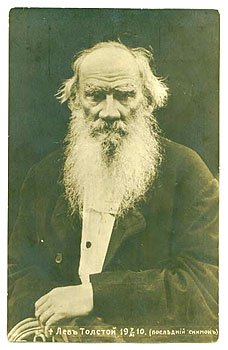So where was Russia at the start of the twentieth century?
An interesting debate over Russia's "progress" before World War I took place in the Slavic Review issues of December 1964 and March 1965: Leopold Haimson, "The Problem of Social Stability in Urban Russia, 1905-1917" (in two parts); Arthur Mendel, "Peasant and Worker on the Eve of the First World War"; Theodore von Laue, "The Chances for Liberal Constitutionalism"; and, Haimson, "Reply." Also in this vein, Hans Rogger, "Russia in 1914," Journal of Contemporary History (October 1966). The optimists argued that conditions were getting better and that it was only World War I which doomed Russia to revolution while the pessimists held that the situation in Russia was not getting better and that revolution was imminent in 1914, postponed only by the outbreak of war.
| I tend to opt for the
pessimist
side of the argument, largely due to the figure of Lev Tolstoi that you
see here to the right. Yes, there was an upsurge in worker-regime clashes after
about 1910 (and especially after the Lena Goldfields massacre of 4
April 1912).
Yes, there were serious economic problems in the countryside with the
upheaval
caused by the Stolypin reforms. Yes, there were
continued outbreaks of anti-Semitic violence, as in the Beilis
case (see the movie, The Fixer).
Yes, the right wing of the political spectrum had become more, and more
organized and forceful., and yes, a lot of the population had been
effectively disenfranchised by
the new electoral laws to the Duma issued by Nicholas II in 1906
(effectively a coup d'état). Yes, Petr Stolypin, the prime
minister, had been assassinated at the Kiev Opera house in 1911.
And, of
course, one cannot forget, the merriment being enjoyed by Rasputin at the Russian court.
|
 |
But real evidence of what ailed Russia in the first decade of the twentieth century could be seen in the last years of Lev Tolstoi, probably Russia's greatest novelist.
As he grew older, Tolstoi became increasingly pre-occupied with his moral concerns (and less concerned with matters relating to his immense wealth, which really irritated his family). In 1901 the Russian Orthodox Church decided that it could no longer deal with his criticisms, and so the church excommunicated him. In 1904, during the Russo-Japanese War, Tolstoi condemned the war, which irritated the Russian government to no end. Finally, in November 1910, Tolstoi took off, abandoning his life, wife, family and wealth, desiring to become a wandering ascetic. A few days later, at age 82, Tolstoy died of pneumonia (20 November 1910), at Astapovo, a remote railway station in Riazan guberniia. Thousands upon thousands of peasants showed up to line the streets for his funeral.
His death,
in fact, the death of the moral conscience of Russia, did
not bode well for Russia's future.
For a contemporary assessment of the state of Russia's intellectuals, the intelligentsia, have a look at the chapter on "The Intelligentsia" from H.W. Williams' 1915 book, Russia of the Russians.
Some recommended books
- Check some selected resources (both book and web) that we recommend to anyone interested in Russian history and culture.
- To follow current events in Russia, check: The St. Petersburg Times, Nezavisimaia Gazeta (in Russian) or Pravda.
- One of the most important intellectual discussions of Russia's past and future occurred in 1911 in the published collection of articles, Vekhi (in Russian). The collection has also been translated by Marshall Shatz and Judith Zimmerman (1994).